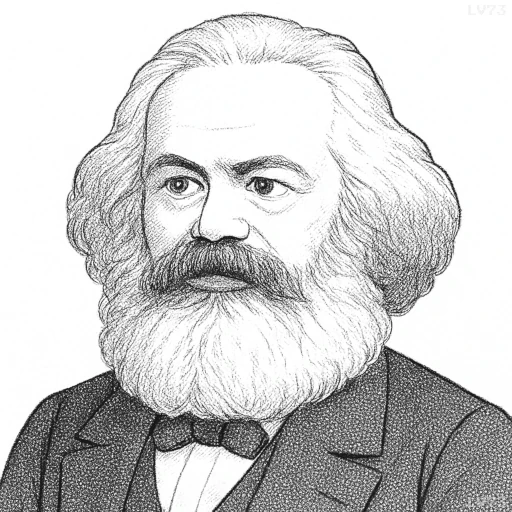“The more the division of labor and the application of machinery extend, the more does competition extend among the workers, the more do their wages shrink together.”

- May 5, 1818 – March 14, 1883
- Born in the Kingdom of Prussia (Germany)
- Philosopher, economist, political thinker
table of contents
Quote
“The more the division of labor and the application of machinery extend, the more does competition extend among the workers, the more do their wages shrink together.”
Explanation
In this quote, Marx addresses the effects of industrialization and capitalist production on workers’ wages. He argues that as the division of labor becomes more pronounced and machinery is increasingly applied in production, competition among workers intensifies. This results in lower wages for the working class. The division of labor refers to the process by which the production of goods is broken down into smaller, specialized tasks, often leading to workers performing repetitive and monotonous tasks, which makes their labor less skilled. As a result, competition increases among workers because they are no longer seen as individuals with specialized skills but as interchangeable cogs in the production process. The application of machinery further exacerbates this situation by allowing employers to replace human labor with machines, further reducing the demand for skilled workers and thereby driving down wages across the board.
Historically, this situation became particularly evident during the Industrial Revolution, when the increased use of machinery in factories significantly reduced the need for skilled labor. As tasks became more specialized and automated, workers were forced to compete for low-wage jobs, as their labor became more standardized and less valuable. This dynamic made it harder for workers to organize and negotiate for better wages or conditions, as employers could easily replace workers with others who were willing to accept lower wages. Marx viewed this as an inherent flaw in capitalism, where the system is driven by the need for profit maximization, which ultimately leads to the exploitation of workers through wage suppression and job insecurity.
In modern times, Marx’s quote is still applicable in discussions about the impact of automation, globalization, and technological advancements on workers’ wages. The gig economy, in which workers often compete for short-term, low-paying jobs with little to no benefits or job security, is a contemporary example of how increased competition and technological advancement can drive wages down. Similarly, the rise of robotics and artificial intelligence in industries like manufacturing, transportation, and service work continues to displace workers, leading to increased competition for the remaining jobs, often resulting in wage stagnation or decline. Marx’s observation serves as a critique of how capitalist systems prioritize efficiency and profit over workers’ well-being, perpetuating a cycle where technological progress and increased productivity lead to greater inequality and exploitation.
Would you like to share your impressions or related stories about this quote in the comments section?

